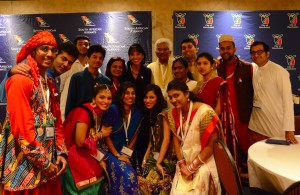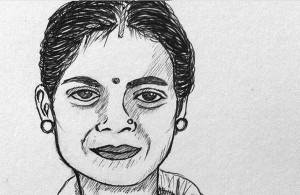. SUSTAINABLE DEVELOPMENT .
an article by Youth Delegates from IIPT India who came to IIPT Conference in South Africa
IIPT India is a new initiative which we need in India because our country has not realized in potential in tourism. We want people to come to India to experience its beauty.

click on photo to enlarge
We are students in management at SVIMS Mumbai University. Our professor Kiran Yadav together with one of his colleagues Ajay Prakash organized an initiative of IIPT (Institute for Peace through Tourism) in India earlier this year and told us about it. We had never before imagined how tourism could promote peace, so we like the concept.
We were pleased at the opportunity to come to this conference in Johannesburg (South Africa) on peace through tourism. We are 14 students, part of a youth leadership forum.
The new Prime Minister of India is now promoting tourism with an “incredible India” campaign. We spoke here with the head of the United Nations World Tourism Organization who told us that when he visited India in 2002 he found that the government was not very interested in tourism. Now that has changed.
Before coming here we mobilized about 500 students to sign the credo of the peaceful traveler developed by the international IIPT.
When we go back we will try to put into practice what we have learned here – especially community-based tourism.
For example, the Dharavi zone in the heart of Mumbai, traditionally considered as a slum, has thousands of small household industries. The entrepreneurs there want to invite tourists to visit them. So now we have guided tours of Dharavi where they show how small- scale industry can play an important part in the Indian economy.
We are inspired by the example we have heard here about climbing Mount Kilimanjaro in Tanzania, and we could do similar tours in the mountains in Maharashtra which is a popular site for trekking not too far from Mumbai.
We have made videos of speakers here at the conference, and we will show them to the students who couldn’t come with us, and to other whom we can interest in the future of IIPT India.
We are interested in internship possibilities for peace through tourism that we have heard about here. And then we can become ambassadors of peace.
Since Indians love the Bollywood cinema, maybe we can interest some actors and actresses to promote peace tourism.
For us tourism used to mean just seeing new places, but now we realize that it can be a chance to know new people and to promote peace.
How can tourism promote a culture of peace?
Comment by Liliana Mota, October 23, 2013
Why tourism?
Can tourism be seen as an instrument to achieve complicity between people’s minds?
“There is nothing better that connects two people’s mind than a good conversation” The above quote could be used to describe the effect which tourism has on people. Like a great conversation, tourism could be said to play a vital role amongst people all over the world. It fosters communication in all its senses, intercultural dialogue and mutual understanding.
In today’s world it is evident that there is a shortage of moral or ethical values amongst people across the different nations in this world, resulting in a globalised world lacking these morals and ethical values. Ignorance, the failure to consider the needs of others, and selfishness are a few of the ways which hinder us from embracing diversity and a common human perspective, which would result informal empathy, internal moral compassion, tolerance of differences, historical consciousness and interpretation. The above mentioned features are intrinsic, inherent and can be found in the practice of tourism.
Tourism has been emphasized as one of the most effective instruments which continue to tackle to tackle social and economical poverty, as well as encourage the culture of peace practice amongst people. In looking at the UN architecture, one is able to see the growing implications which the tourism sector has on the world and world policies. The touristic phenomenon has achieved a world record of 5% of world’s GDP contribution and is responsible for 235 millions jobs, according to the UNWTO’s data. Often the tourism sector counts more than 20% of the countries’ GDP.
On the negative side of this, it is evident that tourism focuses on economical matters, depriving any focus on the global implications of the constant interaction tourism encourages.
In the literal sense, tourism is nothing more or less than people meeting with the willingness to understand each other’s differences and point of view and simultaneously creating the opportunity for dialogue, mutual understanding and peace to take place.
Apart from tourism, various factors could be seen to play a role in encouraging integration and diversity amongst societies across the world. For example, the cultural segment has played an essential source of people’s integration and inclusiveness in developing countries.
Education has also played a significant role in encouraging integration, and incorporation amongst people all over the world. Education has been reconsidered and proposed to being the catalyst for exchange between countries, cultures and sectors, and most importantly for enhancing the lives of people by granting them the opportunity to leave their poverty stricken lives and societies in exchange a for better future which includes job and exchange opportunities.
In the tourism world, differences play the most essential role, differences among people represents the added-value. Being different is always a positive factor that usually motivates and encourages people to get to move and engage with each other and embrace the differences with the use of spiritual, religious and cultural meanings.
This notion of tourism needs to be addressed in multilateral governance discussions, where all the main actors, the international community, the ministerial and experts, private sector, local institutions and civil society engages are all present, and are all willing to work together in combined efforts and initiatives (from poverty alleviation to the promotion of awareness of sustainable development addressing special needs like regional development, urban planning and protection of natural and cultural landscapes). This combined approach of working at the local level within communities and at the national and international level, in order to reach and engage the poor, has been considered as potentially being the “one possible and effective answer” and effective approach towards the world’s poorest areas where it can make a difference.

